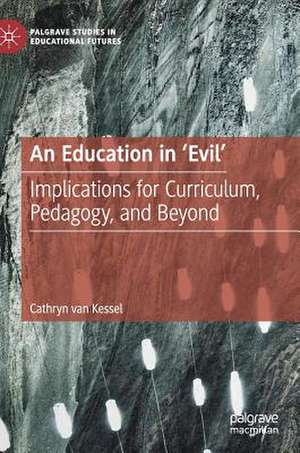An Education in 'Evil': Implications for Curriculum, Pedagogy, and Beyond: Palgrave Studies in Educational Futures
Autor Cathryn van Kesselen Limba Engleză Hardback – 29 apr 2019
Din seria Palgrave Studies in Educational Futures
- 17%
 Preț: 393.92 lei
Preț: 393.92 lei - 9%
 Preț: 628.66 lei
Preț: 628.66 lei - 15%
 Preț: 640.88 lei
Preț: 640.88 lei - 18%
 Preț: 905.36 lei
Preț: 905.36 lei -
 Preț: 484.69 lei
Preț: 484.69 lei -
 Preț: 386.61 lei
Preț: 386.61 lei - 15%
 Preț: 578.55 lei
Preț: 578.55 lei -
 Preț: 358.79 lei
Preț: 358.79 lei - 18%
 Preț: 1001.19 lei
Preț: 1001.19 lei -
 Preț: 353.99 lei
Preț: 353.99 lei - 15%
 Preț: 695.01 lei
Preț: 695.01 lei - 18%
 Preț: 1001.19 lei
Preț: 1001.19 lei - 18%
 Preț: 1001.95 lei
Preț: 1001.95 lei - 18%
 Preț: 943.25 lei
Preț: 943.25 lei - 18%
 Preț: 1001.50 lei
Preț: 1001.50 lei - 18%
 Preț: 891.48 lei
Preț: 891.48 lei - 18%
 Preț: 723.06 lei
Preț: 723.06 lei - 18%
 Preț: 727.31 lei
Preț: 727.31 lei - 15%
 Preț: 703.06 lei
Preț: 703.06 lei - 15%
 Preț: 699.93 lei
Preț: 699.93 lei
Preț: 497.12 lei
Preț vechi: 584.85 lei
-15% Nou
Puncte Express: 746
Preț estimativ în valută:
95.13€ • 101.72$ • 79.31£
95.13€ • 101.72$ • 79.31£
Carte tipărită la comandă
Livrare economică 17 aprilie-01 mai
Preluare comenzi: 021 569.72.76
Specificații
ISBN-13: 9783030166045
ISBN-10: 303016604X
Pagini: 137
Ilustrații: XIV, 155 p. 1 illus.
Dimensiuni: 148 x 210 mm
Greutate: 0.36 kg
Ediția:1st ed. 2019
Editura: Springer International Publishing
Colecția Palgrave Macmillan
Seria Palgrave Studies in Educational Futures
Locul publicării:Cham, Switzerland
ISBN-10: 303016604X
Pagini: 137
Ilustrații: XIV, 155 p. 1 illus.
Dimensiuni: 148 x 210 mm
Greutate: 0.36 kg
Ediția:1st ed. 2019
Editura: Springer International Publishing
Colecția Palgrave Macmillan
Seria Palgrave Studies in Educational Futures
Locul publicării:Cham, Switzerland
Cuprins
1. Introduction.- 2. Evil is in the Eye of the Beholder.- 3. Banal Evil and Social Studies Education.- 4. Processes of Evil as a Supplement to Citizenship Education.- 5. The Politics of Evil.- 6. Symbolic Evil and the Schooling System.- 7. Evil, Existential Terror, and Classroom Climate.- 8. Epilogue.-
Recenzii
“This book is a great choice for anyone looking for a new way to think about ethical dilemmas and hard conversations as they exist in the classroom and in schooling more generally. … This book is a forceful read that adds a new perspective to educational theory and practice.” (Victoria Davis Smith, Theory & Research in Social Education, January 22, 2020)
“A unique and valuable apparatus that can help educators and students reconceptualize evil as being a perpetually developing and creative force. … elementary school educators could benefit from the identification of theories and concepts that could serve as starting points for discussion with younger students.” (Bretton A. Varga, The Journal of Social Studies Research, Vol. 43 (4), October, 2019)
Notă biografică
Cathryn van Kessel is Assistant Professor in the Department of Secondary Education at the University of Alberta, Canada. As a researcher, a former secondary school teacher, and a current educator of pre-service teachers, her work seeks to blend educational theory and practice in provoking ways, particularly in relation to philosophy and social psychology.
Textul de pe ultima copertă
This book asserts that engaging with divergent understandings about the nature of evil and how it functions can help those interested in education think through issues in curriculum, pedagogy, and beyond. The author provokes thinking about and through the concept of evil in the spirit of thoughtful education (as opposed to thoughtless schooling) toward how we might live together in less harmful ways. Although thinking about evil can be uncomfortable and troubling, such inquiries help us explore what sort of relations we want to have with others. Analyzing our role in evil as humans, as well as our responsibilities to counter the processes of evil present in our everyday lives, opens up a potential to foster radical thought in and out of the classroom.
Caracteristici
Explains how pedagogy of banal evil can subvert “villainification” (the creation of a single actor as the face of systemic harm). Anti- villainification allows for the teaching and learning of history and contemporary events to exist in the tension between simplistically blaming one person and absolving us all from blame by (also simplistically) blaming the amorphous entity “society” Drawing from a phenomenographical study and the concept of order-words from Delezue and Guattari, examines the power of the label, evil, in the context of the study of historical and contemporary events Examines "Symbolic Evil" in the context of Canadian and US systems of schooling at the classroom, school, district, and national levels, noting the power of Symbolic Evil to help us redefine educational concerns like student “success”
